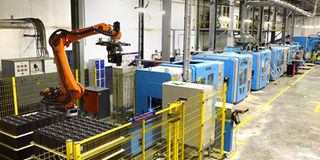ABM’s fully-automated line to output more batteries a month
Sponsored by Associated Battery Manufacturers

Associated Battery Manufacturers (ABM) has installed a modern automated production line at their facility in Industrial Area, Nairobi.
Coming at a cost of Ksh200 million, the fully-automated production line has the capacity to output 110,000 batteries in a month.
The innovation has brought a high level of efficiencies when compared to the semi-manual line, which is able to produce slightly over 50,000 batteries in a month.
“With the automation, we have attained a higher consistency in the quality of batteries produced and an unmatched productivity output in the region,” said Guy Jack, Group Managing Director of ABM, during a tour of the facility.
ABM still achieves a high level of consistency in its semi-manual line, Jack pointed out. However, with the automated machine, the company is set to produce a much higher level of consistency in quality, he said.
With the automation, ABM has embedded sustainability in the entire production process. “The new line produces minimal waste and low scrap rates,” Mr Jack said. This has enhanced the firm’s environmental sustainability agenda.
ABM is the sole manufacturer of Chloride Exide automotive and solar batteries in East Africa. The firm is a leader in battery technologies, with the latest being the ABM maintenance-free battery, which comes ready to use and sealed. “It is of higher quality, longer lifespan and requires no maintenance,” says Stanley Ng’ang’a, the head of production.

Mr Ng’ang’a lauds the new automated line for its high efficiencies, saying: “With a higher output, the cost of production goes low. It has a better return on our investment.”
The firm expects to recoup the investment within a four-year period, according to Mr Jack. “It is quite a significant investment, and if it can give us what we need, it is actually worth it.”
The new efficiencies at ABM may favour consumers, as the firm is looking for ways to maintain the product pricing or even bring down the prices. “The more we can do in terms of efficiencies, the less the cost of resources. If we get this right, it will allow us to drop the prices or maintain them,” said Jack.
About 50 percent of ABM’s market is within Kenya. ABM also has a growing market in Tanzania and Uganda, and the entire East and Central Africa, including Ethiopia, Sudan, Madagascar, Mozambique and Congo.


